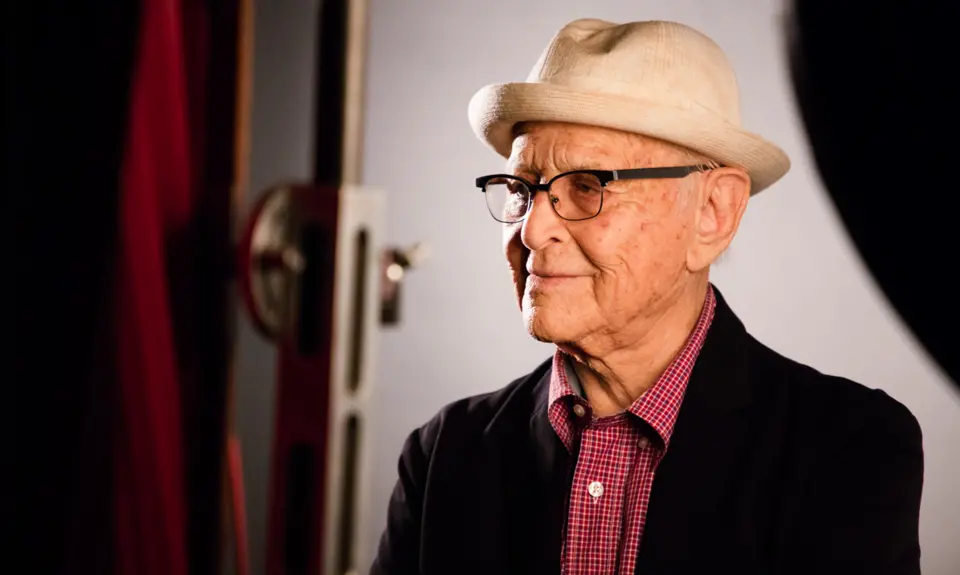At the Celebration of Life for Norman Lear held on the UCLA campus this past June, six months after his death, much was said of the life that Lear himself celebrated each day. Fittingly, the gathering concluded with a live performance of “What A Wonderful World,” said to be his favorite song. Seated among the crowd that afternoon, I heard lyrics that seemed as much a joyous commentary on the world that lay ahead for him (“… skies of blue / And clouds of white / The bright blessed day / The dark sacred night…”) as the one being left behind.
Six months later, with the first anniversary of his death falling exactly a month after an election that would have dispirited him, “What a Wonderful World” comes to mind. It’s not difficult to imagine Norman shaking off the significant dust of November 5 to remind us of the still-wonderful world beneath it – if adding a more impassioned plea that we care for it.
I was invited into Norman’s world in 1991, not long after arriving in Los Angeles in pursuit of a long-held dream of working in television programming, though with no idea how to realize it. Eking out an existence as a freelance writer, I had been offered an assignment to interview him in connection with his soon-to-debut (and ultimately short-lived) CBS comedy Sunday Dinner.
For the first of what became two interview sessions, we met in his Hollywood office – heady stuff not just for a newcomer to town but also for someone raised on Norman’s 1970s television output.
He was both interesting and interested, as eager to discuss the world and others as himself. So much so that at the end of our second session, sensing permission, I steeled myself to seize on what I knew to be a singular opportunity.
“Given what I want to do with my life here,” I said, “I can’t sit with someone like you and not get your advice. But I don’t have a clue how to do that nor how to do it without sounding like every other person who’s sat in this chair before me.”
His lips curved into a knowing smile. “I absolutely know what you’re trying to say,” he replied. “But in this town, you’ll never get anywhere unless you ask.” He leaned forward. “So, ask.” And I did. For his advice and his guidance.
A month later, following a letter sent on my behalf, I sat in the corner office of CBS president Jeff Sagansky to talk about a job. And on an April Monday not long after that, the job – and a dream – was realized.
Throughout the 15 years at CBS that followed – and in fact throughout the 32 years that I kept in touch with the person who made them and what came after possible – I heard countless similar tales. Of Norman doing, in this light doing for others. Evidently rooted in a complicated childhood, the passion for doing, not merely living, informed his school years and war experiences, his move to and early inroads in Hollywood as a writer, the massive achievement that was his TV success in the 1970s, and the philanthropic endeavors that followed. A doing connected to a bettering of the human condition, predicated on the power of the written word and the moving image. That this power became so corrupted in recent years only emboldened his doing further still.
My contact with Norman in recent years had only been through email. But I did have a final visit with him in June of 2023, a month shy of his 101st birthday. He was interesting and interested, talking of a changing TV landscape, the upcoming election, the state of the country and especially of its young people. The living had become more complicated, but the drive for doing remained. Which probably explains why when I received an email late on December 5 last year from someone among his inner circle, alerting me to look for “news about our mutual friend and mentor” the next day, it never occurred to me that the news would be of his death. I assumed he had a new television project.
Norman Lear’s living has come to an end. But the spirit of his doing remains. I think often of that first meeting in 1991, during which he handed me a book entitled The Choice Is Always Ours, taken from a nearby shelf. He’d opened it to a specific page with highlighted text that he suggested I’d find worth reading. Which I did that night.
The highlighted passage was a quote from French Protestant minister and noted pacifist Philippe Vernier:
“…do not wait for great strength before setting out, for immobility will weaken you further. Do not wait to see clearly before starting, one has to walk toward the light…Take this step! Perform this act! You will be astonished to feel that the effort accomplished, instead of having exhausted your strength, has doubled it, and that you already see clearly what you have to do next.”
As this critical year closes and 2025 looms, I find myself re-reading the passage, wondering if in his own way Norman would remind us that if we feel our strength exhausted by recent events, we need take only one step in the coming years, perform one act in the name of social justice, to see that in the doing our strength has actually doubled. And that we’ll then see clearly what we have to do next.
The choice is always ours.
